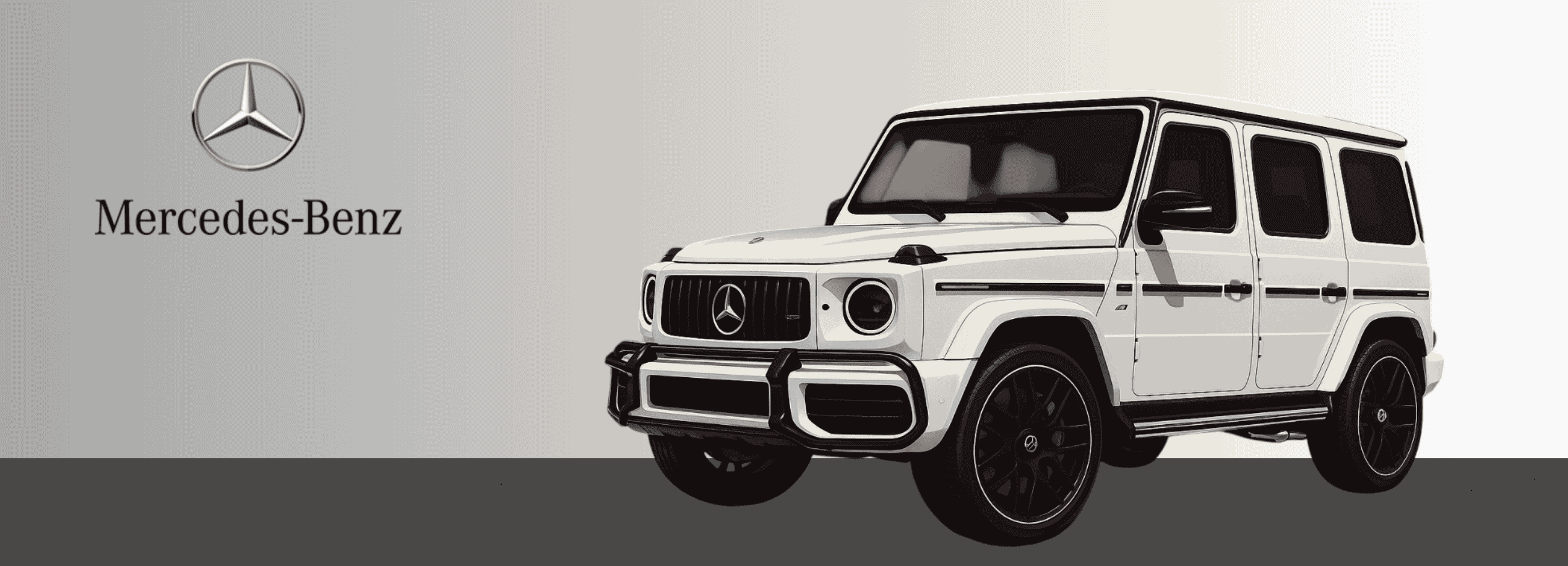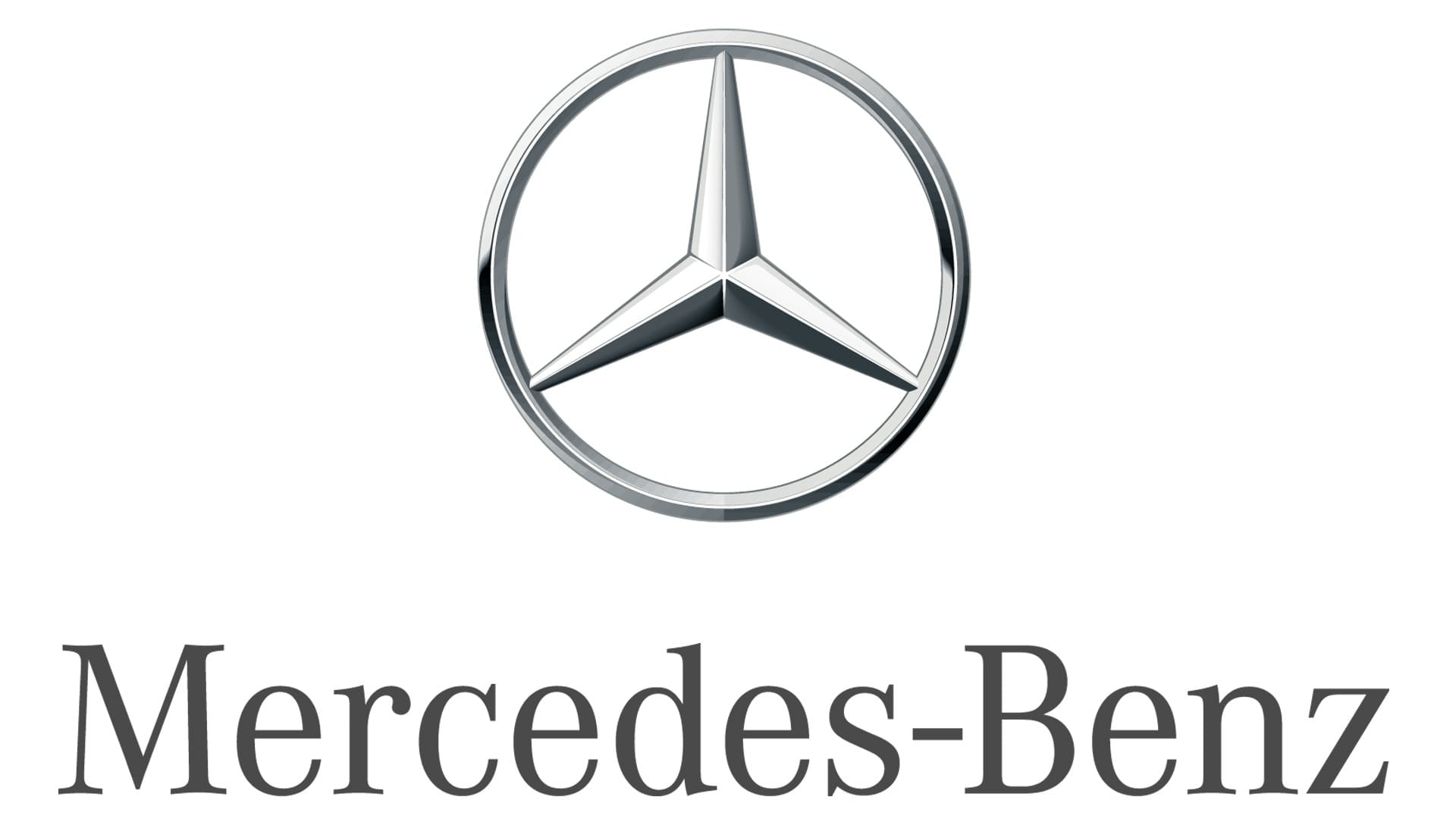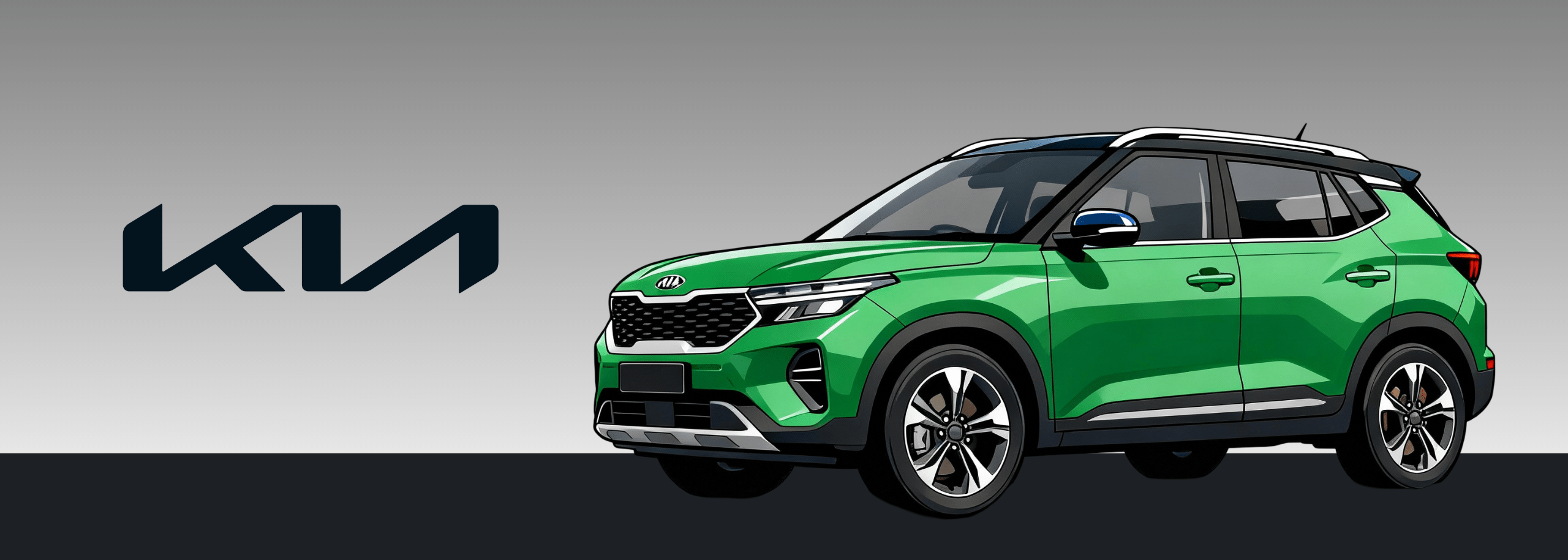Company Overview
Mercedes-Benz Statistics: The Mercedes-Benz Group AG (formerly Daimler AG) is an automotive company that develops, manufactures, distributes, and sells premium vans and cars. The company also offers leasing, financing, car subscription, fleet management, car rental, digital services for payment and charging, insurance brokerage, and mobility services. The company operates in the 3 reportable segments, namely Mercedes-Benz Cars, Mercedes-Benz Vans, and Mercedes-Benz Mobility.
Mercedes-Benz Cars offers a diverse range of products across 3 key categories: Top-End, Core, and Entry. The Top-End portfolio includes the luxury brands Mercedes-AMG and Mercedes-Maybach, the iconic G-Class, and all S-Class models. The Core range, representing the heart of the brand, features the popular Mercedes-Benz C-Class and E-Class models, along with their various derivatives. The Entry segment provides an accessible entry point into the compact vehicle category, with the A-Class and B-Class models and their derivatives.
Mercedes-Benz Vans offers a wide selection, including the large Sprinter van, the mid-size Vito, and the compact Citan. In the private customer sector, the V-Class Marco Polo and V-Class families represent the mid-size van segment, while the T-Class caters to the small van market. Mercedes-Benz Mobility, the financial and mobility services arm, supports global sales with tailored financial services, including financing, leasing, insurance, and flexible subscription models. Fleet management services for business clients are also available, primarily through the Athlon brand.
The company operates globally through production sites and manufacturing plants in the United States, Germany, Spain, Hungary, Mexico, Argentina, South Africa, and China. In 2024, Mercedes-Benz sold a total of 2,389,000 cars and vans worldwide.
Mercedes-Benz Real Facts
- Founders of the Automobile: Karl Benz created the first gasoline-powered car, the Benz Patent-Motorwagen, in 1886, widely recognized as the birth of the modern car. Daimler and Benz merged in 1926 to form Mercedes-Benz.
- Annual Revenue: In FY2024, Mercedes-Benz Group AG reported revenues of approximately €153.2 billion, with a strong performance in its Mercedes-Benz Cars segment.
- Global Workforce: As of 2024, the company employs over 167,000 people globally across manufacturing, R&D, and administrative sectors.
- Electric Strategy: By 2030, Mercedes-Benz aims to go all-electric wherever market conditions allow, with significant investments in battery technology and EV platforms.
- Luxury Market Leader: Mercedes-Benz ranked #1 global luxury car brand in terms of brand value, ahead of BMW and Audi, according to Interbrand’s 2024 report.
- R&D Investment: In 2024, Mercedes-Benz spent around €10.5 billion on R&D, focusing on autonomous driving, electrification, and digital ecosystems.
- Global Production Network: The company operates over 30 manufacturing facilities worldwide, including plants in Germany, the US, China, Hungary, and South Africa.
- Safety Innovations: Mercedes-Benz pioneered several firsts in automotive safety, such as the crumple zone (1959), anti-lock braking system (1978), and PRE-SAFE system (2002).
- Flagship Model: The S-Class remains the brand’s most advanced model, often introducing technologies that later trickle down to other vehicles.
- Formula One Legacy: Mercedes-AMG Petronas F1 Team won eight consecutive Constructors’ Championships (2014–2021), marking a dominant era in F1 history.
Segmental Analysis
Mercedes-Benz Cars
- Mercedes-Benz Cars saw a 3% decline in unit sales in 2024 compared to the previous year.
- The Top-End segment had 281,500 units sold, representing 14% of total sales in 2024, a drop from 16% in 2023. This decrease was mainly due to challenging market conditions in China, model changes, and reduced demand for electric vehicles.
- The Core segment saw a 6% increase in unit sales, driven by strong demand for the E-Class and GLC models. This segment accounted for 59% of total sales in 2024, up from 54% in 2023.
- The Entry segment represented 27% of the total portfolio in 2024, a decrease from 30% in 2023. Unit sales in this segment were 14% lower than the previous year, mainly impacted by developments in China.
- In terms of key markets, China led with 34% of total sales, followed by the United States at 16%, Germany at 11%, and other European markets (EU, UK, Switzerland, Norway) accounting for 22% of total sales.
- As of December 2024, Mercedes-Benz Cars had 139,196 employees.
Mercedes-Benz Cars – Unit Sales by Product Categories
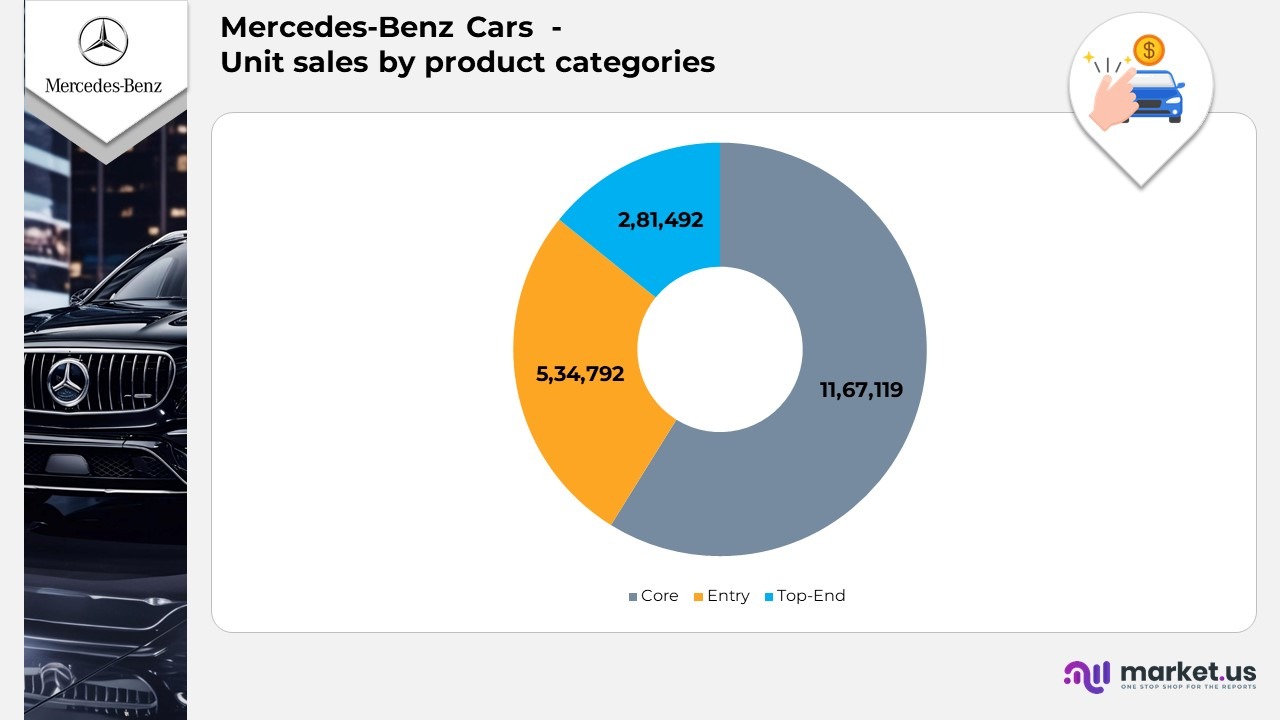
(Source: Mercedes-Benz Group Annual Report)
Mercedes-Benz Cars Statistics – Unit Sales by Top End
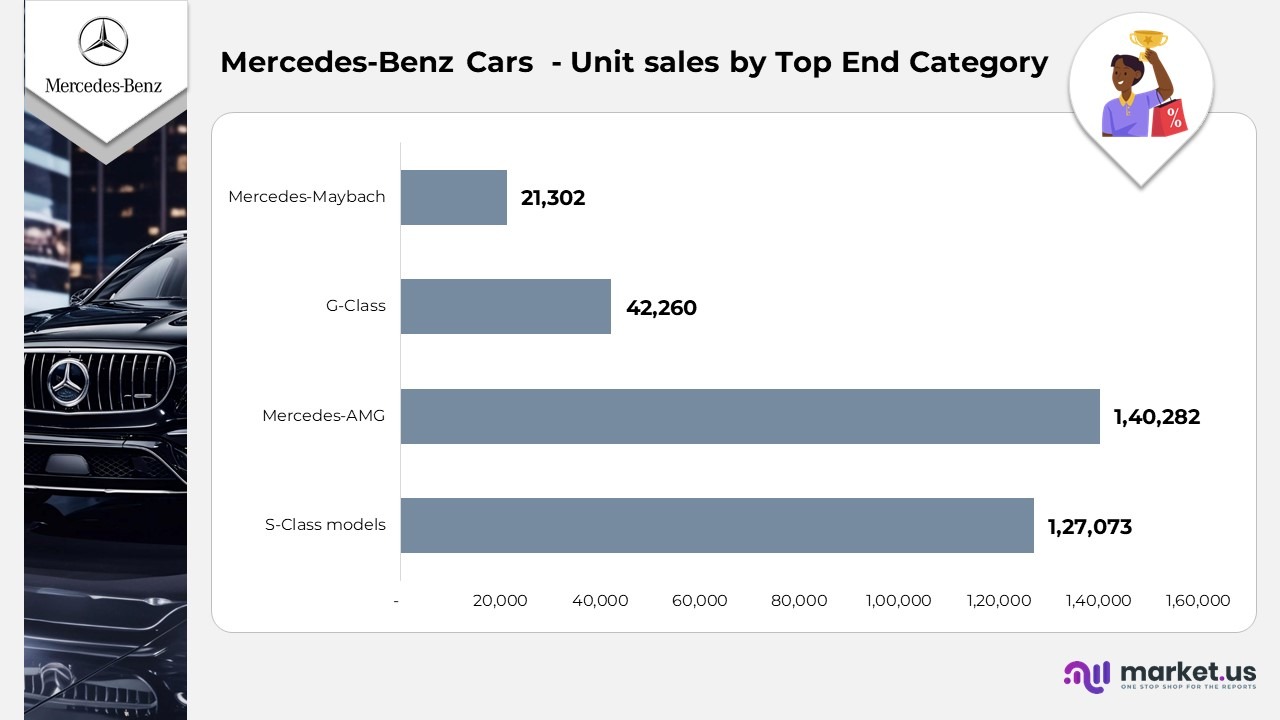
(Source: Mercedes-Benz Group Annual Report)
Mercedes-Benz Cars – Unit Sales by Core
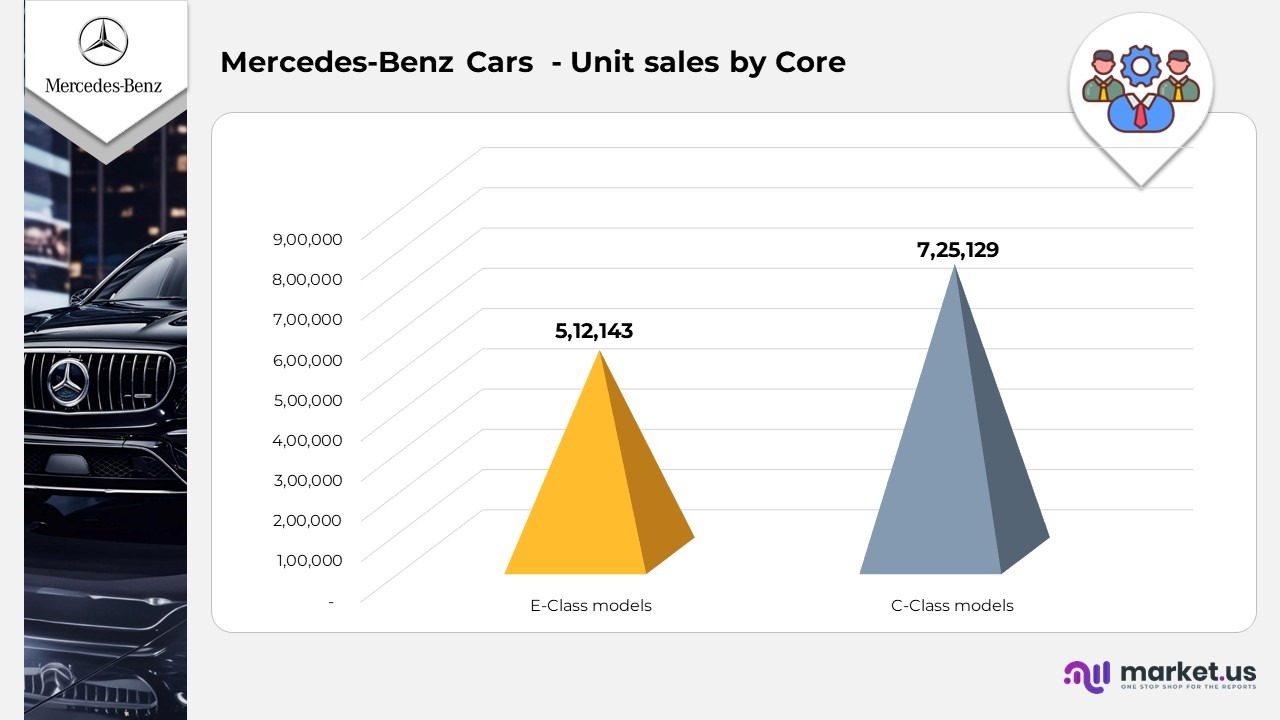
(Source: Mercedes-Benz Group Annual Report)
Mercedes-Benz Cars Statistics – Unit Sales by Entry
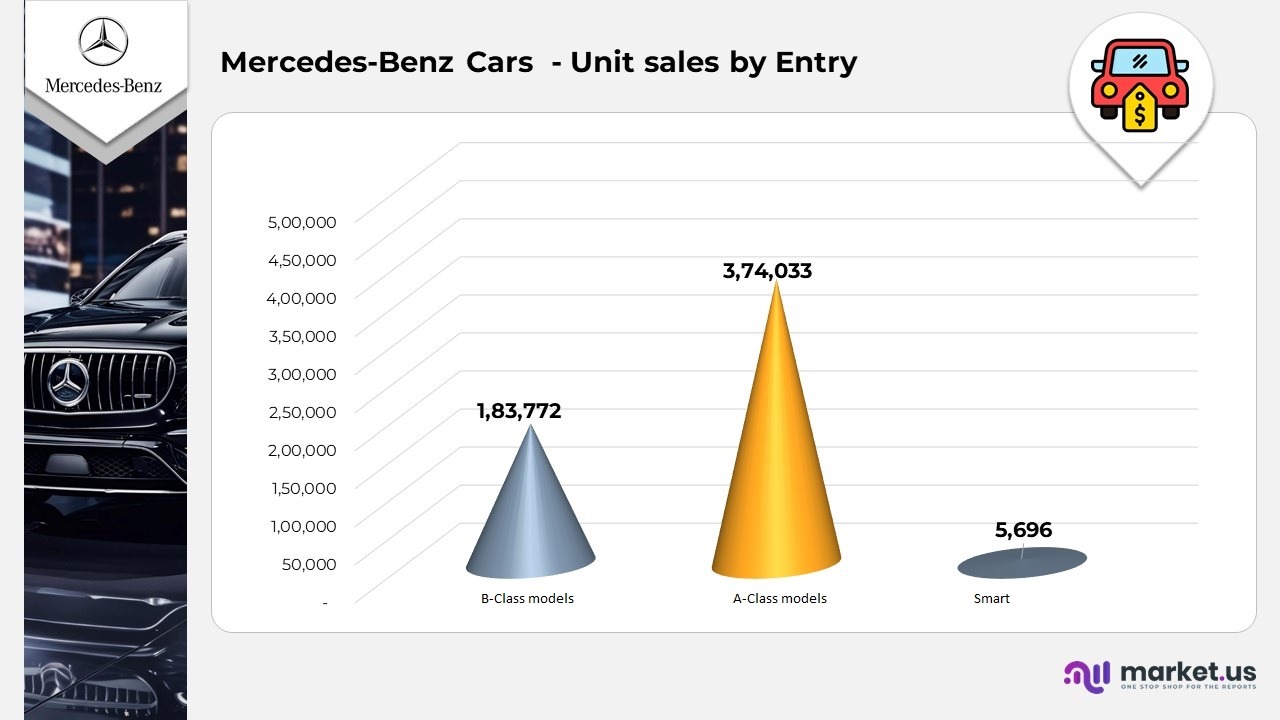
(Source: Mercedes-Benz Group Annual Report)
Mercedes-Benz Vans
- Mercedes-Benz Vans recorded global sales of 405,600 vehicles in 2024, compared with 447,800 units in 2023.
- Worldwide sales of electrified vans totaled 19,500 units in 2024, down from 22,700 in 2023. These were entirely all-electric models.
- Electrified vans represented 4.8% of total sales in 2024, slightly lower than the 5.1% share in
- Germany accounted for 25% of Mercedes-Benz Vans’ total unit sales in 2024.
- Other European markets, including the European Union, the United Kingdom, Switzerland, and Norway, contributed 41% of sales.
- The United States represented 12% of total unit sales.
- China made up 7% of overall sales.
- As of December 2024, Mercedes-Benz Vans had 18,871 employees.
Unit sales by Commercial Vans
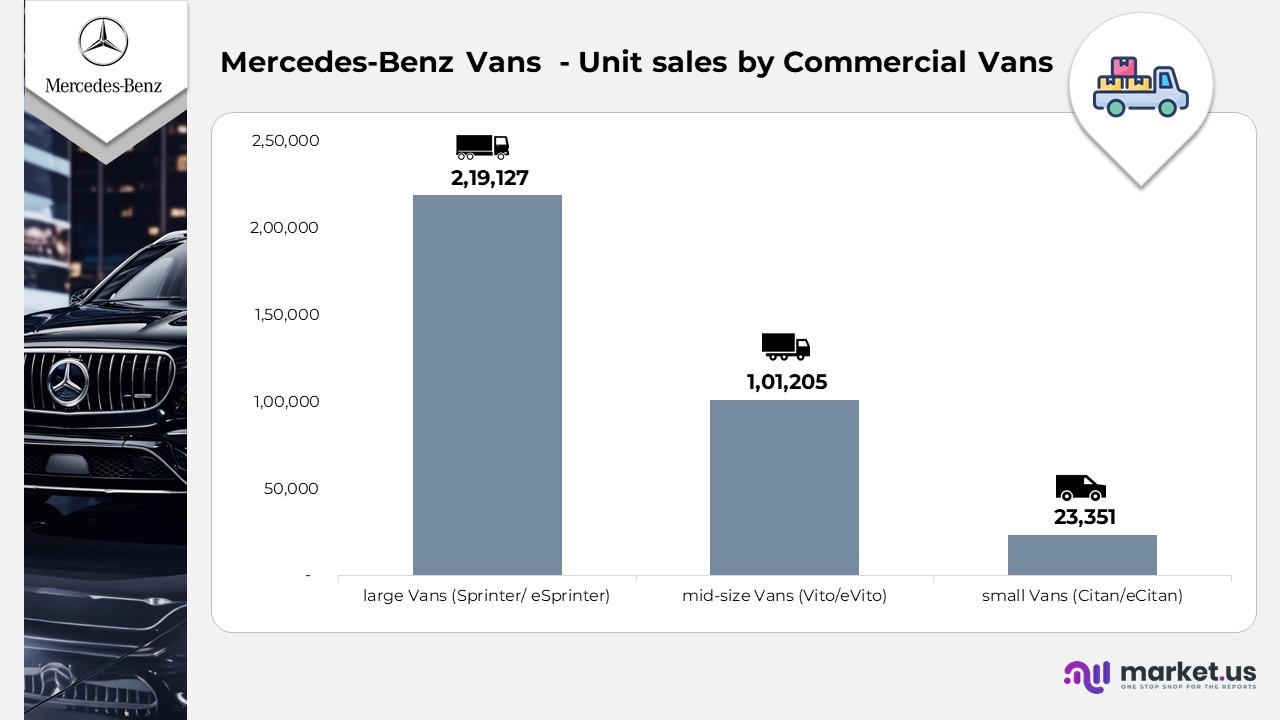
Mercedes-Benz Vans – Unit sales by Private Vans
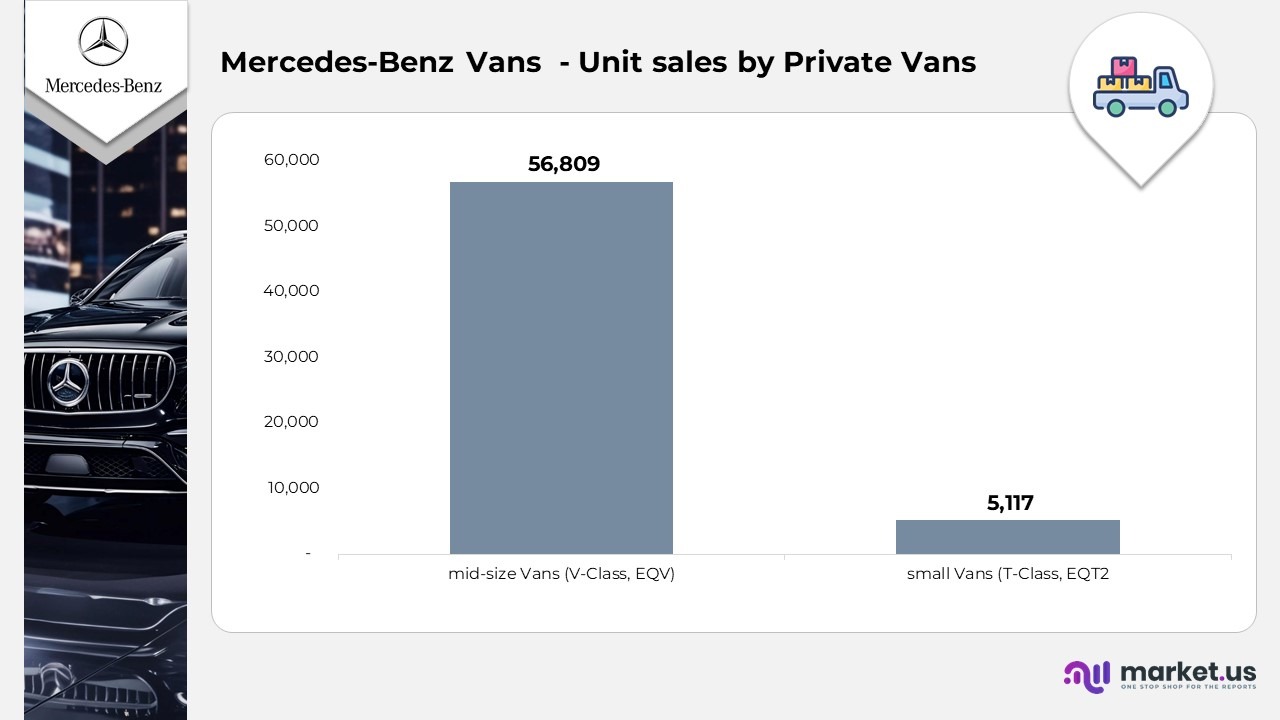
Mobility of Mercedes-Benz
- The Mercedes-Benz Mobility division reported a contract volume of €138.1 billion at the end of 2024, compared with €135.0 billion in 2023, reflecting a +2% increase (0% after exchange-rate adjustment).
- The number of new financing and leasing contracts stood at 1.25 million in 2024, down 11% from 1.40 million in 2023.
- New business reached €59.5 billion in 2024, only 4% lower than the €62.0 billion recorded in 2023, supported by higher average contract volumes.
- In Germany, new business totaled €9.4 billion, a -10% decline, while contract volume decreased to €22.5 billion, down -8% from the prior year.
- Mercedes-Benz Mobility operates in 34 markets worldwide, offering customized services designed around individual customer needs. In 2024, its strongest presence was in the United States, which accounted for 30% of the portfolio.
- Germany followed as the second-largest market with a 16% share, while China represented 10%, underscoring its position as another key growth region.
(Source: Mercedes-Benz Group Annual Report)
Financial Analysis
Group Revenues
- In 2024, Mercedes-Benz reported revenue of €145.6 billion, compared to €152.4 billion in 2023, reflecting a decline mainly caused by reduced unit sales, an unfavourable product and market mix, and negative net pricing effects.
- Cost of sales reached €117.0 billion in 2024, nearly unchanged from €117.4 billion in 2023. Lower unit sales and efficiency gains in procurement and production were offset by higher lifecycle-related costs, increased supplier expenses, valuation adjustments for electric-vehicle leasing, elevated credit risk costs in the United States, and adverse interest rate movements in financial services.
- Gross profit declined from €35.0 billion in 2023 to €28.6 billion in 2024, reducing its share relative to revenue.
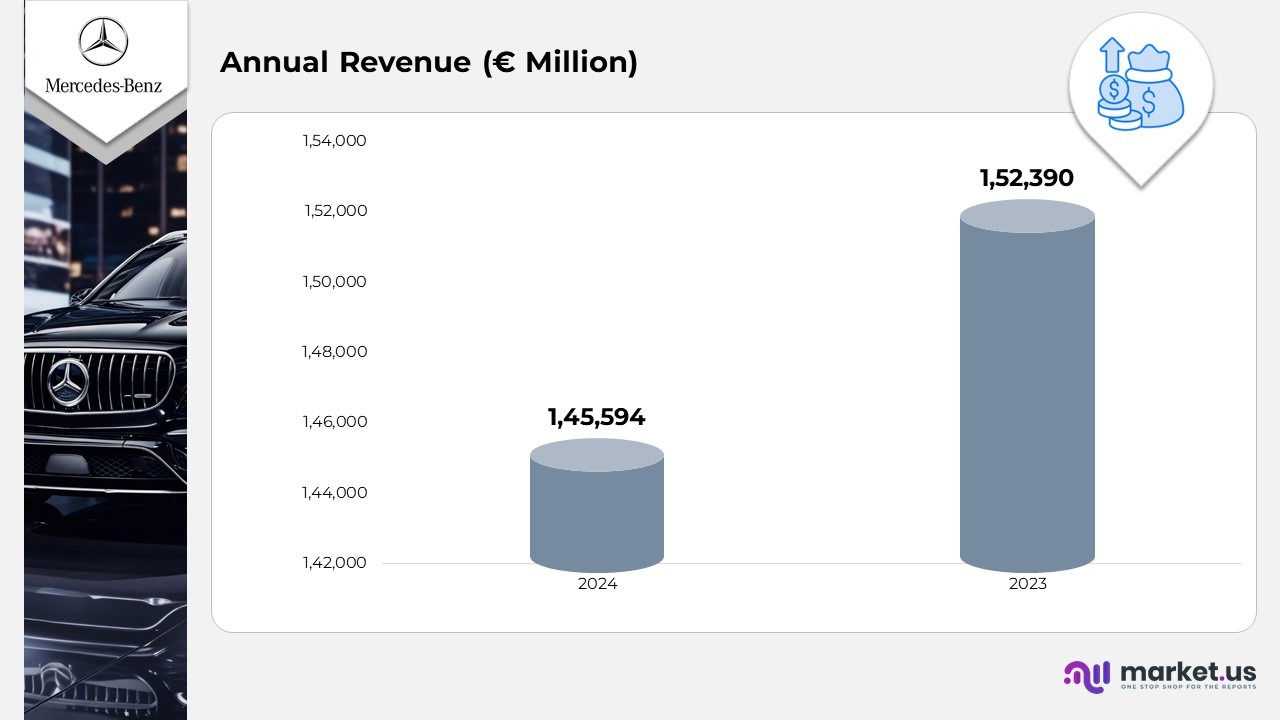
(Source: Mercedes-Benz Group Annual Report)
R&D Expenditure
- Research and development spending at Mercedes-Benz Group totaled €9.7 billion in 2024, slightly lower than €10.0 billion in 2023.
- Out of this, €4.1 billion was capitalized (2023: €3.8 billion), resulting in a capitalization rate of 43%, up from 38% in the previous year.
- Mercedes-Benz Cars invested €8.7 billion in R&D during 2024, compared to €9.1 billion in 2023. The reduction was linked to lower research and non-capitalized development costs for existing models and conventional drivetrains. However, increased capitalization focused on advancing electromobility, digitalization, and automated driving technologies.
- Mercedes-Benz Vans recorded R&D expenditure of €1.0 billion in 2024, higher than €0.9 billion in 2023. The rise was primarily due to increased capitalized costs tied to the planned fleet transformation, with a major emphasis on the new modular and scalable Van Architecture, while spending on existing models declined.
(Source: Mercedes-Benz Group Annual Report)
Business Revenue
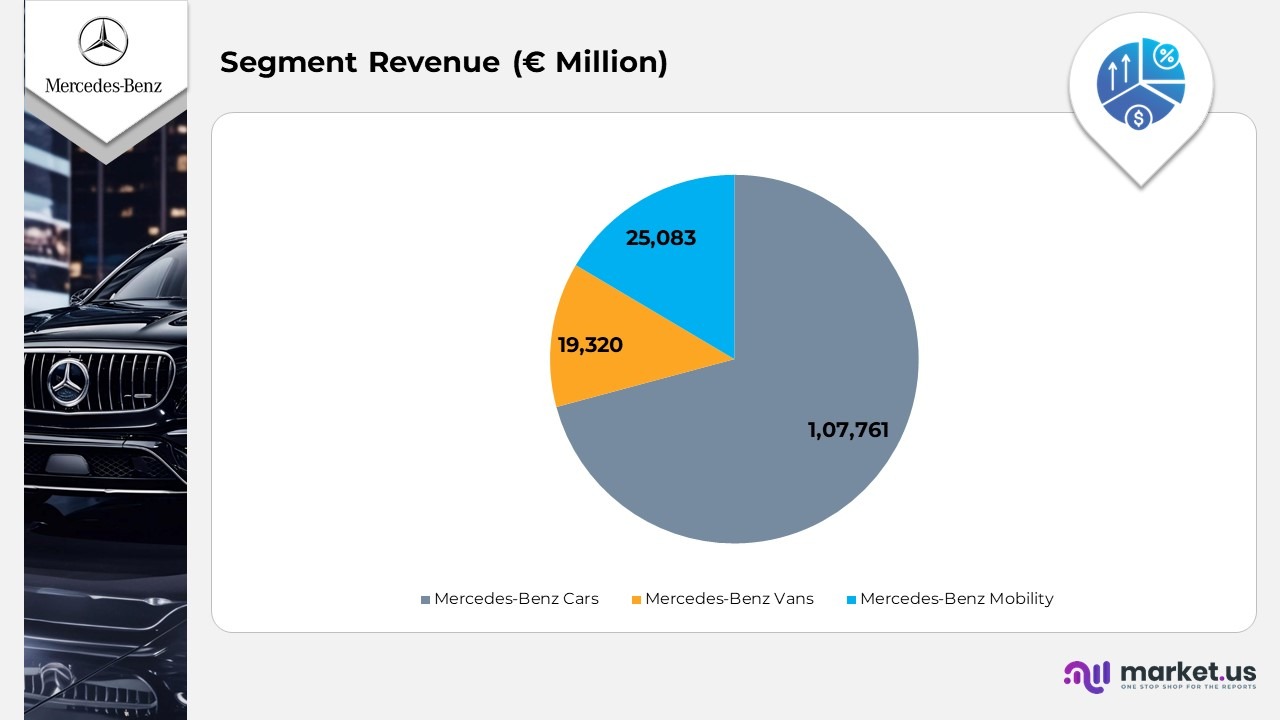
(Source: Mercedes-Benz Group Annual Report and Quarterly Reports)
Geographic Revenue
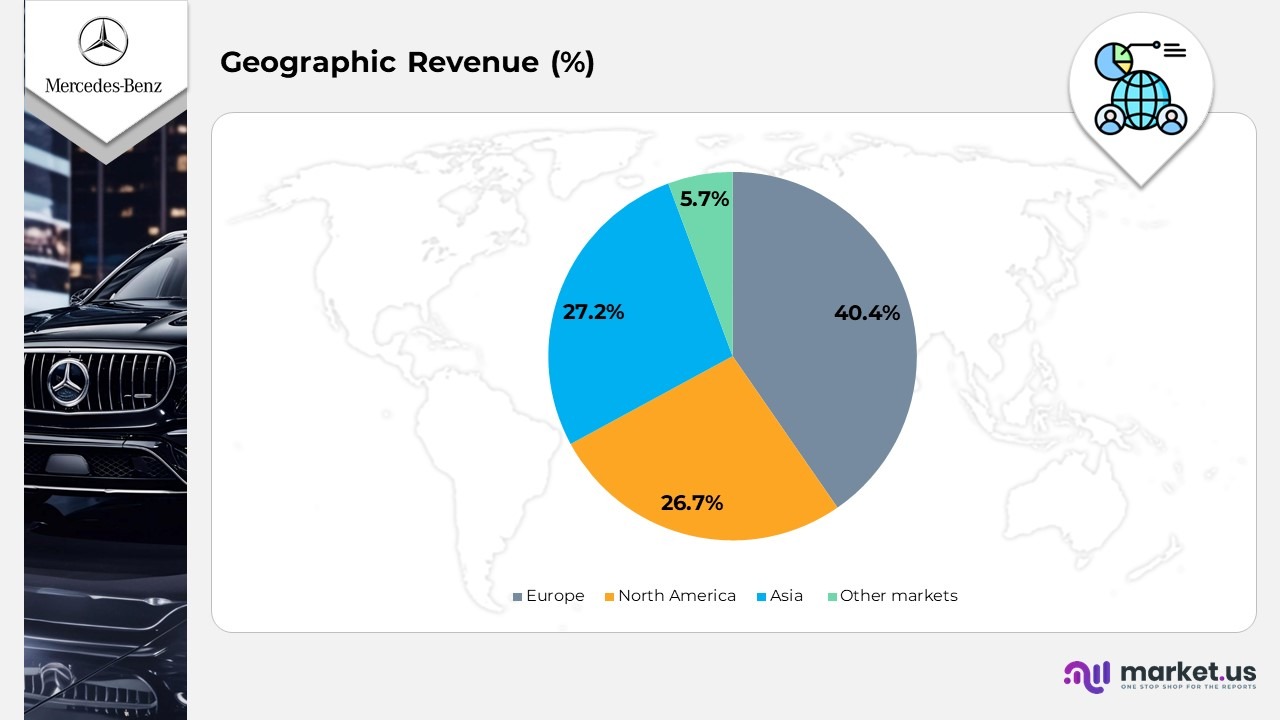
(Source: Mercedes-Benz Group Annual Report and Quarterly Reports)
Investments of Mercedes-Benz
- In 2024, Mercedes-Benz Group allocated €4.0 billion to property, plant, and equipment, an increase from €3.7 billion in 2023.
- Mercedes-Benz Cars directed investments of €3.4 billion in 2024, slightly higher than €3.3 billion in 2023, with a strong focus on rolling out derivatives of the new drive-flexible MMA and electric MB.EA platforms.
- Mercedes-Benz Vans recorded investments of €0.6 billion in 2024, compared with €0.4 billion in 2023, primarily dedicated to supporting the brand’s transformation initiatives.
(Source: Mercedes-Benz Annual Report, and Quarterly Reports)
Recent Developments
- In October 2025, the company expanded the testing facilities at the Global Proving Ground in Immendingen. The upgrade allows comprehensive evaluation of headlight systems under stable and repeatable conditions, unaffected by time of day, weather, or external environmental factors.
- In September 2025, Mercedes-Benz launched an integrated bidirectional charging service at IAA Mobility 2025. The all-electric GLC will be the first model equipped with this innovation, with additional vehicles such as the upcoming CLA series set to adopt it over time. The rollout will initially start in Germany, France, and the United Kingdom, with expansion into other markets planned progressively.
- In November 2023, Mercedes-Benz Mobility expanded its digital services, enabling customers in multiple markets to submit contract applications online.
- In November 2023, the company expanded the Mercedes-Benz Charging Hub network in Germany, aiming to deploy more than 2,000 proprietary charging stations globally, equipped with over 10,000 fast-charging points.
(Source Mercedes-Benz Annual Report, Company Website)
Mercedes-Benz Fun Facts
- The “Mercedes” Name: The name “Mercedes” came from Mercedes Jellinek, the daughter of early Daimler car dealer Emil Jellinek—he insisted future models bear her name.
- Gullwing Doors Fame: The iconic 1954 Mercedes-Benz 300 SL Gullwing was the world’s fastest production car at the time and remains a collector’s dream.
- NASA Tech: The seats in the Mercedes-Benz S-Class are inspired by NASA’s zero-gravity design, offering optimum spinal support and posture comfort.
- Logo Meaning: The Mercedes-Benz three-pointed star symbolizes the brand’s ambition to dominate land, sea, and air transportation.
- Pop Culture Appearances: Mercedes-Benz cars have featured in dozens of blockbuster movies, including the Transformers series and Marvel’s Black Panther.
- Autonomous Driving Level 3: Mercedes-Benz was the first automaker to receive regulatory approval for Level 3 automated driving in Germany (2022), ahead of Tesla.
- Luxury Limo to Dictators: The Mercedes-Benz 600 Pullman was once the car of choice for many world leaders and controversial figures, including Fidel Castro and Kim Jong-un.
- World’s Most Expensive Car: In May 2022, a 1955 Mercedes-Benz 300 SLR Uhlenhaut Coupé sold for €135 million, making it the most expensive car ever sold.
- First to Offer “Perfume in a Car”: Mercedes introduced an active fragrance system in the S-Class that dispenses custom scents via the AC.
- “Drives Itself” Since the 1990s: As early as 1994, Mercedes-Benz tested autonomous driving on German autobahns using their VITA project—well before the term “self-driving car” became mainstream.


